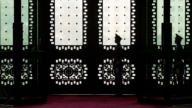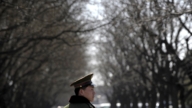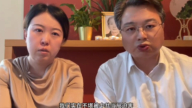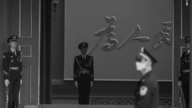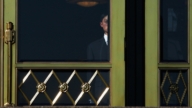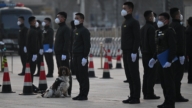【新唐人2014年03月11日訊】在正在召開的中共「兩會」上,中共領導人習近平提出「不能在一片改革聲浪中,把國有資產變成謀取暴利的機會。」媒體高調報導。但回顧歷史,中共的高官家族在過去30年中,利用各種手段占有國有資產,中國的國有資產流失並成為私人壟斷行業的現象越來越嚴重。下面請看詳細報導。
「國有資產」是指屬於國家所有一切財產和財產權利的總稱。
而國有企業私有化,則是把國有企業賣給民營公司、外資公司或個人等,非國家控股的企業或個人。國有資產流失就是國有資產的出資者、管理者、經營者,因主觀故意或過失,違反法律、行政法規和規章,造成國有資產的損失。
回顧歷史,1949年中共建政後在城市沒收資本家財產後,又針對民族資本家和私營個體勞動者,搞所謂公私合營,取締私有經濟﹔在農村搞所謂「人民公社」,土地收歸國有等。
文革後1980年代,中共開始所謂改革開放。國有資產流失的現象越來越引起學者的重視。
原中國民營企業家陳俊賢:「國有是全民所有,但是中國人從來沒有得到一分錢的紅利。在改革開放之後的話,國企、集體企業政企分開,就把國有企業、集體企業,都把它賣掉了,老百姓又沒得到一分錢。國有資產到哪裏去了呢?大部分就落到『紅頂商人』那兒。」
中國最熱點人物——神秘富商周濱,被大陸《財新網》曝光,時任「中石油」公司總經理的蔣潔敏,曾親自批示,以極低價格將「長慶油田」的兩個油區,包給了周濱,周濱轉手就賺了5個億,造成國有資產嚴重流失。而周濱是中共前政治局常委,政法委書記周永康的長子。
旅加前寧波工程學院教授張新宇:「八十年代,他要出口的話,出口甚麼或者進口甚麼,必須共產黨的幹部領導來批,這就叫批文。這個批文就是一種權力,那麼因此第一代太子黨他起來的,就是利用批文起來的。」
1989年由學生發起的「反官倒、反腐敗」學運,就是針對這一現象,而遭到北京的暴力鎮壓。
張新宇:「92年左右,引進了這個股票,共產黨那個股市,消息都是他手裡抓著。就是通過他們內部的消息,不斷的讓他們這些延安兒女後代發財。後來九十年代後期,開始所謂的國營企業私有化過程,定價都是由領導說了算的,也就是他父親來定價的,他兒子來買,或者是兒子再跟地方的一個當官的或有錢的,互相串通起來。」
現居加拿大的前寧波工程學院教授張新宇介紹,後來中共搞所謂招商引資,太子黨們又以發展經濟為名,到銀行貸款幾千萬,上億元,但有貸無還。最後這一筆爛帳被全部轉到中央銀行,由中國老百姓承擔下來。
張新宇:「共產黨這幫流氓,坑矇拐騙,用一種變相的,嘴上說的是我是公有制,我是社會主義,但是它用各種辦法來進行一個私有化過程,整個過程就是把大量的國營的、社會的財富,全部私有化到他們的後代手裡」
中共前黨魁江澤民當政期間,對大量國有企業進行兼併、股份制改造等,造成上百萬工人失業﹔同時,以江澤民、曾慶紅為首的太子黨家族壟斷中國通訊、能源、礦山、金融等行業,使國有資產嚴重流失。
大陸實力最強的國企有中石油、中石化、中海油、中國電信、中國建築等,其中中石油和中石化曾經長期被周永康家族盤踞,中海油則由曾慶紅家族把持。江澤民的兒子江綿恆被稱為「電信大王」。
民眾對中共高官家族占有國有資產,早已心灰意冷。有網友說:國內的私有化不過是領導變老闆,以私有之名利用行政資源享壟斷之實,所以改不改都一樣。
採訪編輯/唐音 後製/蕭宇
Where are the State-owned assets? Who made excessive profits from them?
During the Chinese Communist Party’s parliamentary meetings,
Chinese president Xi Jinping said, “Reforms cannot be taken
as an opportunity to make excessive profits from state-owned assets".
His remarks got a lot of media attention.
However, the situation of senior officials and their families
taking state-owned assets for their own private monopolies
has only gotten worse in the past 30 years.
Let’s see the report.
The term “State-owned assets" collectively refers to all
properties and property rights of the state.
The privatization of a state owned enterprise (SOE) is to sell the
SOE to foreign or domestic private companies, or individuals.
A state owned asset is lost when it is damaged due to the
intentional or negligent violation of laws by investors,
managers, or operators.
After the CCP came to power in 1949, it confiscated capitalists’
assets and merged them with private business assets to create
state-owned businesses, abolishing the privatized system.
In the countryside, all land was seized by the CCP,
turning it into state-owned land.
After the Cultural Revolution, the CCP began
so-called reform and opening up in the 1980s.
The phenomenon of state-owned asset loss
has drawn increasing attention from scholars.
Chen Junxian, former Chinese private entrepreneur:
“State-owned means it is owned by the people; but the
Chinese people never see a penny of bonuses.
After the reform and opening up, the state-owned enterprises
and collective enterprises were separated, and later sold;
the Chinese people still didn’t get one penny.
Where are the state owned assets?
Most of them fell into the pockets of red crown businessmen."
During the CCP’s annual parliament meetings, China’s
most popular person – a mysterious businessman Zhou Bin,
was exposed by Caixin website.
Former PetroChina general manager Jiang Jiemin personally
sold two oil fields to Zhou Bin for very cheap.
Zhou Bin handed out and earned 500 million,
resulting in serious loss of state assets.
Zhou Bin is the eldest son of Zhou Yongkang,
the former CCP Politburo Standing Committee member
and former head of the Central Politics and Law Committee.
Zhang Xinyu, former Ningbo University of Technology professor:
“In the 1980s, both import and export had to be approved by the
CCP cadres, that’s the official approval.
It’s a type of privilege.
That’s how the first generation of princelings gained their power."
The 1989 student movement of “anti-profiteering, anti-corruption"
opposed this phenomenon.
They faced violent cracked down by Beijing for this.
Zhang Xinyu: “The stock market was introduced around 1992 and
the stock information was controlled by CCP.
They continually made those Yan An descendants become rich
by internal stock information.
In late 90s, in the so-called privatization of SOEs,
officials decided the prices, which means the father set
the price and the son paid the bill, alone or in collusion
with a local official or rich person."
Professor Zhang Xinyu says that in the name of the CCP’s
policy of attracting capital, princelings received tens of millions
or billions of yuan in loans from banks in the name of developing
the economy but never repaid them.
Finally, all the bad debt fell on the central bank,
to be undertaken by the Chinese people.
Zhang Xinyu: “The hooligan CCP has lied and cheated
in disguise of public ownership and socialism.
In privatization, a large amount of state-owned
and social wealth fell into their hands."
During the administration of former CCP leader Jiang Zemin,
a large number of SOEs went through merging and restructuring,
resulting in millions of unemployed workers.
In the meanwhile, the families of the princelings, headed by
Jiang Zemin and Zeng Qinghong, monopolized
China’s telecommunications, energy, mining, and finance,
and caused serious loss of state assets.
Among the most powerful SOEs, PetroChina and Sinopec
have long been entrenched by Zhou Yongkang’s family;
while China’s National Offshore Oil Corporation
was dominated by Zeng Qinghong’s family.
Jiang Zemin’s son Jiang Mianheng was called the
“king of telecommunications".
People have completely lost their hope
for the state assets occupied by CCP officials.
Some netizens say the privatization
is just officials becoming the boss.
In the name of privatization,
the administration enjoys its monopoly on resources.
Interview & Edit/Tang Yin Post-Production/Xiao Yu


